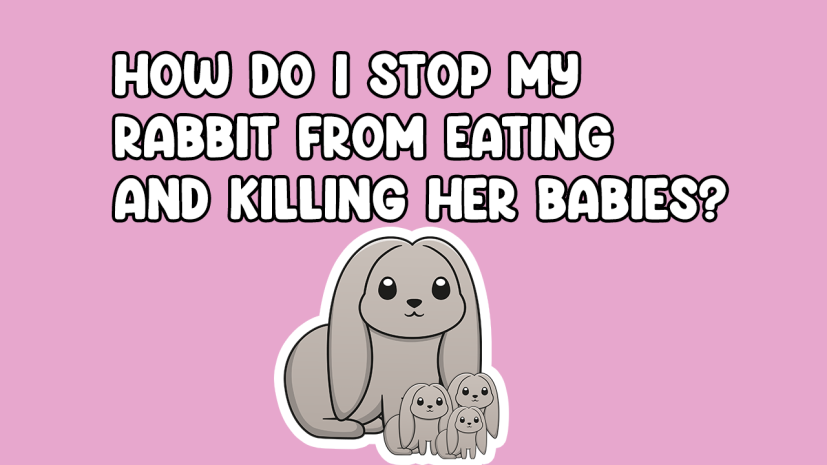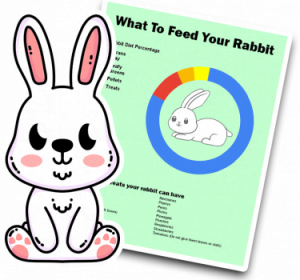
Becoming a pet owner requires learning about and understanding our furry friends’ behaviors and instincts. This is crucial during reproduction and maternal instincts, as a lack of knowledge could lead to alarming and distressing situations.
You may ask: “Why does my rabbit keep killing her babies?” This in-depth guide will explore the reasons behind such behavior, common rabbit maternal instincts, preventive measures, and what to do if you find yourself in this situation.
To optimally prepare your rabbit for the imminent birth of her kits, make sure to enrich her diet with plenty of Alfalfa hay. This simple yet essential step significantly prevents the mother from resorting to the unfortunate act of cannibalizing her young due to a lack of nutrients.
Right after giving birth, it is quite common for the doe to consume the placenta. This behavior, although natural and usually harmless, can be risky as there’s a chance she might mistakenly harm or even ingest a kit.
Vigilance is key in these situations. Look out for any early signs indicating the mother rabbit poses a risk to her offspring. If you spot any such signs, it’s crucial to take prompt action and move the kits to a safer environment, ensuring their protection and well-being.
Yes, In some unfortunate cases, mother rabbits can harm or even kill their offspring, often referred to as ‘kits’. This scenario, albeit unsettling, happens due to various reasons ranging from environmental stressors to the presence of weak or sickly kits.
Mother rabbits, like many other species, can exhibit what seems like irrational behavior in response to specific stimuli in their environment. These reactions are often survival instincts honed over thousands of years, not signs of a cruel or inadequate mother.

Generally, male rabbits, also known as bucks, are not typically known for harming or eating their offspring. Unlike some species, where male parental infanticide is a common survival tactic, rabbit bucks do not usually display this behavior. However, it’s important to remember that individual behavior can vary, and stressful circumstances or environmental factors may provoke unusual behaviors.
In rabbit social structures, the buck’s primary role is to mate with the doe, not to participate in child-rearing. In fact, after mating, it is advisable to separate the male from the pregnant female. This is not because the male rabbit threatens the babies, but rather to prevent immediate re-mating, which could lead to health issues for the female rabbit.
That being said, every animal can be unpredictable in certain situations. It’s always wise to monitor any interactions between a male rabbit and kits, especially if the buck seems anxious, stressed, or overly curious. If you notice any signs of aggression, separating them immediately is crucial to ensure the kits’ safety.
Rabbits, especially new mothers, may demonstrate unexpected and sometimes alarming behavior towards their kits. Understanding typical rabbit maternal behavior is essential in differentiating between normal and potentially harmful behavior.
Rabbits are instinctually very protective of their young. They often limit their interactions with their kits to feeding times to avoid attracting predators.
However, when mother rabbits feel threatened or believe their kits are in danger, they may harm or even kill their babies as a protective measure.
Several factors can lead to a mother rabbit harming her kits. Among them, stress, lack of resources, and the presence of sickly kits are the most common. Stress can be due to environmental changes, disturbances, or perceived threats, while inadequate resources include a lack of food, water, or proper nesting area.
Sickly kits might be viewed as a threat to the overall survival of the other babies, leading the mother to eliminate what she perceives as the weakest link.
Whilst it may sound cruel, this is simply a part of nature and something we
If you notice that your rabbit is acting aggressively towards her kits, taking immediate steps to rectify the situation is essential.
Keep a close eye on your rabbit’s behavior without being intrusive. If the harm continues, consider separating the mother from her kits and seek immediate veterinary care. Always consult a professional before drastically changing your rabbit’s environment or care.

It’s widely believed that if human handlers touch a rabbit’s babies, the mother will smell the human scent on them and reject or even harm the kits. However, this is actually a myth. Unlike some wildlife, rabbits do not typically abandon their babies if they carry the scent of humans.
Rabbits are unlike birds, who might reject their offspring due to foreign scents. Instead, a mother rabbit’s decision to care for her kits is more influenced by factors such as stress, environment, and overall health rather than the smell of human touch.
That being said, it is generally advisable to limit the handling of newborn rabbits. This is not because the mother will reject them but because it’s less stressful for the kits and minimizes the risk of them being accidentally injured or exposed to human germs.
Always ensure your hands are clean if you must handle the kits, and remember if the babies are warm, quiet, and plump, they are likely being well-cared for by their mother. If you have any concerns about the welfare of the kits, it’s always best to consult with a vet or rabbit expert.

By entering your email address you agree to receive emails from Cottontailclub. We'll respect your privacy and you can unsubscribe at any time.